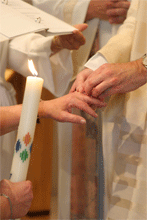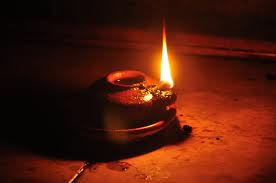I am including here a response to one of the emails I received last week regarding posts on the vocation of CV's living in the world. At issue is my assertion that all persons (not just Israel itself or the Church as a whole) are ultimately called to a spousal relationship with God and thus to spousal love.
 The response I received read as follows: [[Hi Sister Laurel, Once again, I've read your latest post related to consecrated
virginity with great interest and appreciation. I agree with almost everything
that you've said but I'm confused about one aspect of what you've written.
The response I received read as follows: [[Hi Sister Laurel, Once again, I've read your latest post related to consecrated
virginity with great interest and appreciation. I agree with almost everything
that you've said but I'm confused about one aspect of what you've written.
My problem is with your statement that "everyone in the Church is called
to the spousal love which marks God's love for Israel and the Church." It's the
use of the word "spousal" that I question. I understand that the use of "spousal" as you present it is entirely
biblical. (Considering the first reading on Sunday, I could hardly argue
otherwise. Nor would I want to!) The way it's used in the Bible, though, is
commonly understood to speak of God's love for a community, i.e. Israel or the
Church. You say as much in your post.
In writing these posts about consecrated virginity, however, your intent is
to clarify what you think about a particular vocation embodied by individual
women. Given this context, when you say "everyone in the Church is called to
the spousal love which marks ..." it sounds to me as though you're implying
that the only way to describe any personal relationship that an individual has
with God is in spousal terms. I'm quite sure that you didn't mean to leave this impression, but the
bells really went off for me in a later paragraph when you refer to a summons
to"all persons to recognize their call to spousal love in this world."
I
personally don't think that every person is called to a specifically
spousal love in the world but I suspect that I simply don't understand what
you're trying to say here. I most definitely would agree that God seeks an intimate
relationship with each and every person. Indeed, for me, part of embodying Christ's spousal love for the
Church as a CV is to act as a sign of this intimate love that Christ seeks with
every individual. In a world where the love of Christ is more often experienced
as an abstract idea rather than a living reality, CV's have a powerful pastoral
role to play in embodying the possibility of a real relationship with
Christ. I hope sending this query will be helpful to you in some way.]]
 So, first, thanks for your patience with my lack of substantive response over the last 10 days or so. In fact, I do believe that every person is called to spousal love of God. Each person is ultimately called to a love which is all-consuming, covenantal, fruitful, exclusive (though this does not mean exclusionary or exclusivistic), which completes them as persons, involves an exhaustive self-gift and similar reception of the other, and is freely entered into. The only word I know for such a relationship is spousal. At the same time I would argue that this relationship is only achieved partially, fragmentarily, and proleptically this side of the realization of God's Kingdom. In other words, the full realization of the spousal relationship with God is eschatological, integral to a "time" and "space" when God will be all in all and no one is given or taken in marriage. It is an eschatological relationship which we all witness to (and prepare for!) in our own ways.
So, first, thanks for your patience with my lack of substantive response over the last 10 days or so. In fact, I do believe that every person is called to spousal love of God. Each person is ultimately called to a love which is all-consuming, covenantal, fruitful, exclusive (though this does not mean exclusionary or exclusivistic), which completes them as persons, involves an exhaustive self-gift and similar reception of the other, and is freely entered into. The only word I know for such a relationship is spousal. At the same time I would argue that this relationship is only achieved partially, fragmentarily, and proleptically this side of the realization of God's Kingdom. In other words, the full realization of the spousal relationship with God is eschatological, integral to a "time" and "space" when God will be all in all and no one is given or taken in marriage. It is an eschatological relationship which we all witness to (and prepare for!) in our own ways.Thus, I think CV's are called to witness to (and prepare for) this universal call here as a special and even paradigmatic gift to the Church and world. This is another reason I think the term "eschatological virginity" is especially apt for CV's. As I said earlier, you are called to live here and now a relationship which reveals the very nature of the Kingdom of God. You are publicly commissioned to witness to something all are ultimately called to and, unfortunately, very few even begin to imagine. (Further, if we treat, or continue to treat, these vocations as elitist and therefore, as something other than paradigmatic, neither will people ever begin to imagine they are called to this kind of relationship with God.) At the same time I can't think of any vocation which does not reveal some dimension of this kind of relationship especially vividly. That is true whether we are speaking of married people, hermits, religious, priests, or lay life in any form when these are well-lived. In this life we are indeed called not just to intimacy with God but to union with him and some of us are graced to experience this intimacy here and now as nuptial. But each experience of intimacy, each experience of union points us toward that all-encompassing spousal intimacy and union where we are fully welcomed into the very life of God and become One with him. What differs is the charism and mission attached to the vocation. I am publicly consecrated in a spousal relationship with Christ, but witnessing to this relationship is not the specific or primary gift (charisma) or mission of my life. It IS the gift and specific mission of your own life, however.

What I especially think we have to avoid is the notion that while all are called to intimacy with God, SOME are chosen for an even greater intimacy, a more exhaustive and exclusive intimacy which is somehow reflective of differences in "chosenness" or even of status or roles which will be maintained within the Kingdom of God itself. Instead, I think we have to witness to an exhaustive union ALL are completed in and an exhaustive marriage all are ultimately called to. I do that here and now as a hermit in the silence of solitude --- an essentially dialogical or communal form of intimacy fulfilled in union with God. You do that by having become a CV and icon of the Church as Bride of Christ. Married persons reflect this same relationship sacramentally and bring each other to the only One who can truly complete them as human beings. Religious men and women may or may not explicitly witness to Jesus-as-spouse as they remind us of the unitive bond and the community all are made for. Again what differs is the charism and mission of the vocation in question. But in every case I think the bottom line is that in the Kingdom of God we are all called to be participants in a spousal union with God; we are all called to be primary participants in the wedding feast of and WITH the Lamb.





















































